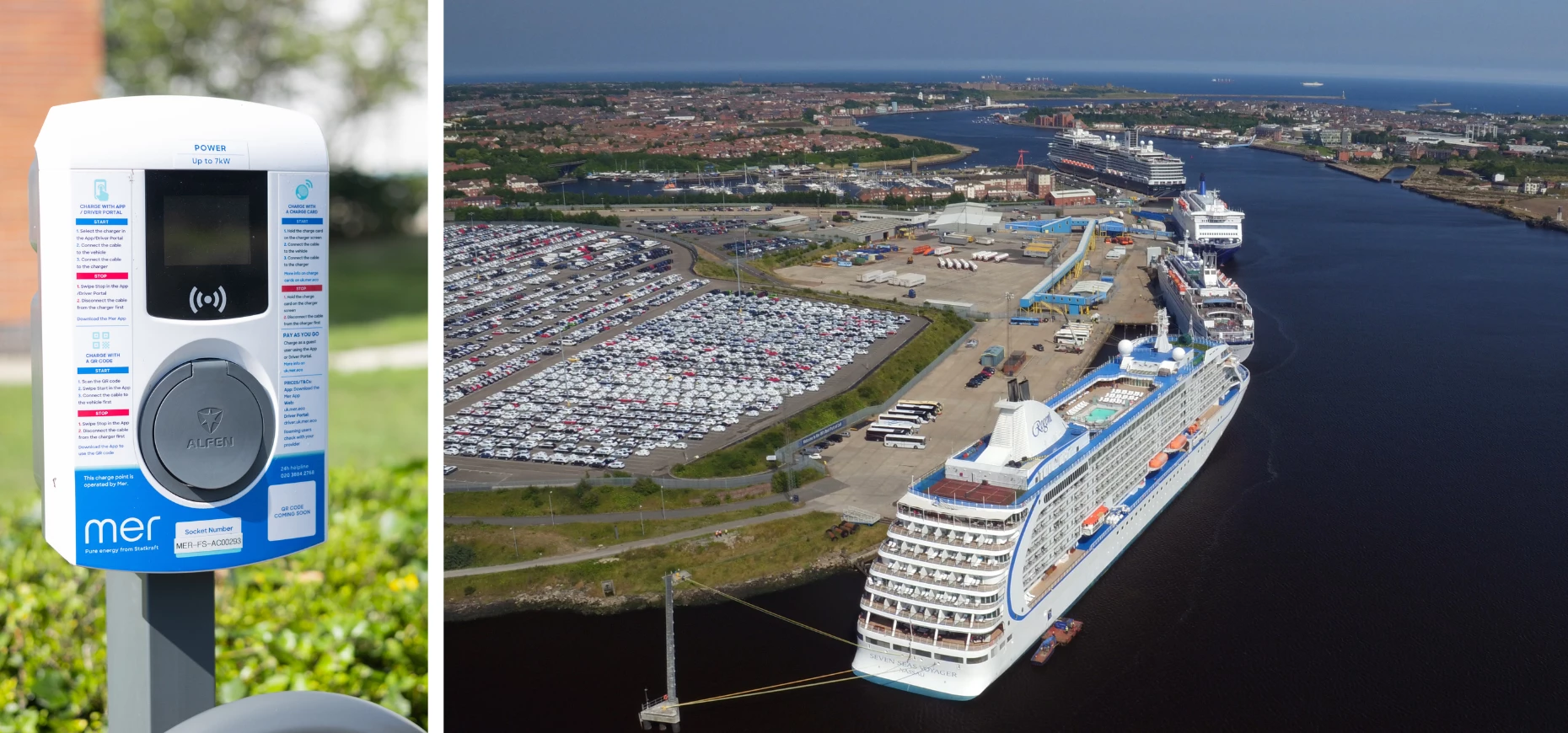
Port of Tyne rolls out EV charging network with help from London based specialist
Port of Tyne has made a “substantial investment” in electric vehicle (EV) charging infrastructure as part of its drive to decarbonise.
The deep sea port claims to be one of the UK’s most efficient, handling goods from around the globe as well as ferry and cruise ship passengers. It required EV charging points across multiple locations on Tyneside, to support the transition of its van fleet to battery power, in addition to providing workplace charging for employees.
Port of Tyne turned to EV charging specialist Mer to help provide a solution. With its head office in London and another in County Durham, Mer delivered a “comprehensive” charging infrastructure package, based on a detailed survey of all Port of Tyne sites.
Mer installed 11 7kW charging points on the South Shields site, including the authority’s headquarters at Maritime House where Mer replaced an older charging post. Mer also deployed a dual 7kW charger at the Port of Tyne’s main ferry terminal building on the northern side of the river.
Dominique Davies, group procurement manager for Port of Tyne, commented: “This investment in infrastructure is part of the Port of Tyne’s ongoing commitment to reduce emissions wherever possible.
“Mer listened to what we wanted and delivered cost-effective solutions tailored to our needs - for both our own fleet and for workplace charging. The Mer Connect software and app enables us to get the best possible usage out of our chargers, by making them accessible to both our van users and our employees.”
The Mer Connect platform provides automated charger management, and the ability to set tariffs, as well as reporting functionality. The app enables users to access the chargers, including taking payments if tariffs are in use.
Karl Anders, managing director of Mer, added: “Port of Tyne is a huge asset to North East England, so we’re very proud to be supporting their decarbonisation plans. Ports around the UK are looking at installing more chargers to meet the needs of their own EV fleets and growing demand for workplace charging from employees.”
In 2019 Port of Tyne launched its Tyne 2050 strategy to lead the way in key areas such as environment and technology, with an ambition to reduce net greenhouse gas emissions to zero by 2030 and to electrify the entire port by 2040.
By Matthew Neville – Correspondent, Bdaily
- Add me on LinkedIn and Twitter to keep up to date
- And follow Bdaily on Facebook, Twitter and LinkedIn
- Submit press releases to editor@bdaily.co.uk for consideration.
Looking to promote your product/service to SME businesses in your region? Find out how Bdaily can help →
Enjoy the read? Get Bdaily delivered.
Sign up to receive our daily bulletin, sent to your inbox, for free.








 The real cost of tendering for construction SMEs
The real cost of tendering for construction SMEs
 A welcome step forward – but let’s keep pushing
A welcome step forward – but let’s keep pushing
 Industrial strategy 'can drive business forward'
Industrial strategy 'can drive business forward'
 Industrial strategy 'can be game-changer we need'
Industrial strategy 'can be game-changer we need'
 Driving skills forward with near £100,000 boost
Driving skills forward with near £100,000 boost
 What pension rule changes could mean for you
What pension rule changes could mean for you
 North East can't be an afterthought in AI future
North East can't be an afterthought in AI future
 Understanding the impact of the Procurement Act
Understanding the impact of the Procurement Act
 Is the UK losing ground in life sciences investment?
Is the UK losing ground in life sciences investment?
 Construction workforce growth can't be a quick fix
Construction workforce growth can't be a quick fix
 Why it is time to give care work a makeover
Why it is time to give care work a makeover
 B Corp is a commitment, not a one-time win
B Corp is a commitment, not a one-time win